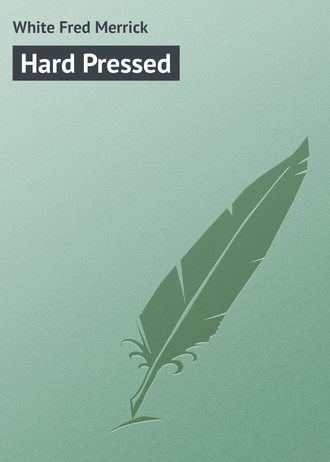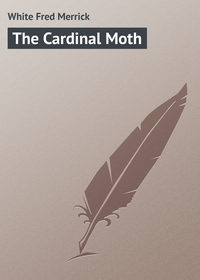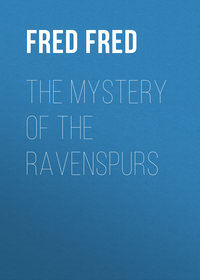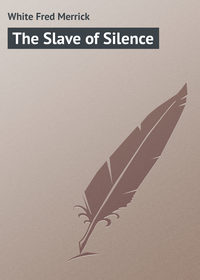 полная версия
полная версияHard Pressed
"Were you altogether to blame?" May asked. "I don't think so. You had no one to look after you from the time you were at school till you came into your property. You were merely a boy then, and you behaved like one."
"Oh, I know, I know," Fielden sighed. "But that's all past and done with. But don't talk about me. I am far more interested in you. I hope nothing has happened to increase your anxiety. You know what I mean."
May looked irresolutely at her companion.
"I ought not, perhaps, to tell you," she said. "I ought not to tell anybody. But, then, well, you are Harry Fielden, and I have known you all my life. If you didn't care for me quite as much as you do, if I had not cared for you – but, there, we need not go into that. It is my father who has worried me. It is extraordinary what a change has come over him lately. He used to be so kind to me, to let me do as I liked, and even when we were so poor that we didn't know where to turn for money he was always happy and cheerful. Why, a few months ago he would have laughed at the idea of my marrying a man like Mr. Copley. Now he is almost eager for it."
Fielden made no reply for a moment. A wave of indignation came over him. He caught his lip between his teeth and bit it fiercely. A year or two ago he would have smiled at the suggestion that Sir George would sanction a match between his daughter and a man like Copley. But during the hard and bitter months of his wanderings he had learnt some amount of cynical wisdom. He was no longer inclined, as he had been in the old days, to take every man at his face valuation. And, no doubt, when the pinch came, Sir George was just like the rest. He would speak loudly enough of his willingness to give up the old house and live in humble lodgings rather than have any slur cast upon his honour. But it would be different when this pretty theory came to be put to the test. Fielden forgot all about the racecourse. He heard nothing of the shouting crowd. The horses streaming to the post conveyed nothing to his eye.
"I want you to be candid with me," he said. "Is Sir George putting pressure upon you to marry that blackguard?"
There was something so vehement in Fielden's speech that May looked at him in astonishment.
"Surely you are going too far," she said. "Mr. Copley is not a gentleman, of course – "
"I tell you, he is a scoundrel," Fielden interrupted. "Believe me, May, I would not have spoken unless I had been bound to. That man is not fit to go into any respectable house. I cannot say more than that at present, because the secret is not altogether mine. But this much I tell you: Had there been no such person as Raymond Copley I should be a rich man at the present moment. I know that, but for the merest accident, there would be blood on that man's hands. You must not marry him, May. You must not give him the slightest encouragement. When I think of your associating with that rascal my blood boils. If the worst comes to the worst, I must tell Sir George what I know myself. It is with the greatest reluctance I entered Copley's employment; indeed, I only did so because there are certain things I want to find out and this seemed to provide a favourable opportunity. Otherwise, I would rather get my living by selling race-cards and sleep under a furze bush. But do you mean to say your father really insists on this?"
A rush of tears filled May's eyes.
"That is what it comes to," she rejoined. "It is only the last two days that I have noticed such a change in my father. Harry, do you think it is as bad as he says it is? He tells me that unless I consent to marry Mr. Copley we shall be ruined and be turned out of the house without so much as a penny. It seems incredible. I can't understand a man with an atom of self-respect who would compel a girl to marry him against her will. It isn't as if I were rich, or intellectual, or beautiful."
Harry thought he could understand. Indeed, any man could understand who looked down into the pretty, pleading, anxious face that was turned up towards Fielden.
"There is no accounting for people like Copley," he said. "He is the kind of man that has not an atom of consideration for anybody but himself. He has no heart or conscience, and the more unattainable a thing is the more he longs for it. He cannot win you; therefore, you are the one thing in the world that he passionately desires. God help the woman, however fascinating and beautiful, who becomes Copley's wife! It would mean years of brutality and neglect and self-contempt. You mustn't, May. I understand the duty you owe to your father, but no man has a right to exact such a sacrifice as that. Don't you think I had better see Sir George and give him a hint of the sort of man Copley is?"
May shook her head resolutely.
"I am afraid that would do more harm than good," she said. "I must fight my battle alone, Harry, and if you interfered my father might forbid you Haredale Park. He has already hinted that, if you had not come home again, I should have been willing to become Mrs. Raymond Copley, and if I were not allowed to see you I don't know what I should do. There is nobody else I could confide in. But I will let you know how things go on. We had better go back. I feel better for this confession."
But it seemed a hopeless business, and Fielden's face was sad and gloomy as he strode alongside May towards the stand.
Ah! but hope was not dead yet.
CHAPTER XVIII
AN EVENING VISIT
FOR once Sir George Haredale did not seem to be in the least pleased to see Fielden. He was standing on the lower steps of the stand talking to Major Carden with the air of one who is conversing with an old acquaintance. By Carden's side was his daughter, eager and interested, following all that was going on around her with the zest and enjoyment of a child.
"Oh, here you are," Sir George said fussily. "I was beginning to wonder what had become of you. Carden, this is my daughter. Major Carden and I were at Eton together. We used to do a good deal of racing before you were born."
The Major took off his hat with a flourish.
"Charmed to meet the daughter of my old friend," he said, "charmed. Ah, those were pleasant days when one had youth and strength and a banking account which appeared to be inexhaustible. Now I deem myself fortunate if I can steal a day off occasionally to get down to a suburban racecourse. Let me present you to my daughter. My dear Alice – "
"But I know her already," May Haredale cried. "We were at school together. I had no idea that my father and yours knew one another. I am so pleased to see you again. Father, Alice Carden was my greatest friend all the years I was at Eastbourne. We parted promising to write to one another regularly, but somehow or another we have never corresponded. But now that I have met you I won't lose sight of you any more. Major Carden, you really must let Alice come and stay at Haredale Park with me. I want her for a long visit."
Carden professed himself to be delighted, and this in all sincerity. He began to see visions of a snug and comfortable time, away from dingy lodgings and vilely-cooked food to which he had never become accustomed. The two girls paired off, and the Major strolled towards the paddock gates, for he had noticed Phillips there, evidently waiting for a chance to speak to him.
"Got any instructions?" the Major asked.
"Nothing fresh," Phillips explained. "I want you to do exactly as I asked you, and if you can manage it this evening, after you get back to town, so much the better. I have written my address on the back of this card, and it is possible I may be here for two or three days longer. I want you to find out what wagering there was to big money with Selwyn at the Post Club to-day, and wire to the address on this card. It is more than probable that, before the week is out, I may be able to put a good thing in your way. I suppose I can come round and see you whenever I like."
The Major thought that would be all right. It would be just as well, perhaps, to get his daughter out of the way. With diplomacy he might contrive to expedite the invitation to Haredale Park, so that he could have the ground clear without fear of interruption. He returned to the place where his daughter was waiting for him.
At a sign from Phillips, Fielden came forward.
"Well," he asked, "how are you getting on?"
"Splendidly," Phillips replied. "I have been far more fortunate than I anticipated. We will get some fun out of Copley and Foster yet. From your point of view I daresay you may think I am wrong. But I mean to make money out of this. I will expose Copley and fill my purse at the same time. You wonder what I am driving at? Can you manage to stay here over to-morrow?"
"I think so," Fielden said.
"That's good. In that case we can push our investigations farther and, with any luck, before the week is out we shall not only know where Copley gets his money, but how he makes it. Of course, we know that he doesn't even begin as a millionaire; we know that he is an unscrupulous adventurer. But he has the command of ready money, and we wish to know how he makes it. As a matter of fact, I know that already. But there are a few weak points in my case, and we can't make a definite move till these are cleared up. Now I want you to have dinner with me in my lodgings. I told my landlady I might have a friend staying with me, and she will be ready to put a bedroom at your disposal."
"Why this mystery?" Fielden asked.
"Oh, it is no mystery. I only want to interest you. After dark we shall indulge in a little quiet burglary, that is, if you don't object."
"It is not an alluring prospect," Fielden said.
"Of course it isn't," Phillips agreed. "But when you are dealing with scoundrels it is necessary to use their own weapons. I presume you are as interested as I am in the exposure of Copley and Foster and all their methods."
"Up to the hilt," Fielden said between his teeth. "Poor as I am, I would give all I possess to bring that about. I would give five years of my life to manage that between now and Derby Day. And if necessary I can find some money. I am better off than I expected, but I intended to keep the money for a start in life later. Still, if you want it and will promise to put it to a good use, I will give you every farthing cheerfully. You have only to say the word."
Phillips chuckled.
"Oh, there's no occasion to do that, sir," he said. "Keep the money in your pocket. I shall have enough and to spare before long. I mean to drag Copley's plunder from between his teeth. I will take all I can get from him, and when the time comes we shall drop a hint in the proper quarter, and there will be an end to Raymond Copley. Within three months you will see that man in gaol. You needn't be alarmed for Miss Haredale. She is as safe from that man as if she were the daughter of the King. I had better be going, because it is as well that we should not be seen talking together for too long. I have scribbled my address on the back of this card, and shall expect you about half-past seven."
Fielden asked no more questions, but returned to his friends with a vivid sense of curiosity. He listened to Major Carden's flamboyant talk, and as he bowed to Alice Carden could not help thinking what a pretty and refined girl she was. He made his excuses for not returning to Haredale, and was faintly amused to see how relieved Sir George appeared to be.
"No, I can't get back to-night," he explained. "I have several things to do here. But I hope to see you on Sunday, if I may be allowed to come over."
"Of course, you may," May smiled, as she held out her hand. "Miss Carden is coming to stay with me to-morrow. I have persuaded her to come at once. I am ashamed to have neglected her so long."
Fielden finished his business, saw the stud-groom and the horses safely on the rail, and then went to the retired part of the village where Phillips' lodgings were situated. It was little more than a cottage, but the place was neat and clean, and the cooking left nothing to be desired.
"It is only a bit of fish and a steak," Phillips said cheerfully, "but you will find it beautifully served, and as to the wine, well, I got that myself, and I know it is everything it should be. Please sit down and make yourself at home. We can discuss matters over our cigars. There's nothing like racing to give you an appetite. I only hope it won't snow before morning."
"I hope not," Fielden said. "To all intents and purposes the racing was spoilt this afternoon by the snow, and it is very odd that no one saw a yard from start to finish of the three o'clock race. It was most annoying."
"Was it?" Phillips asked. "Well, I confess I didn't find it so. Yesterday at the time of the three o'clock race I was at the Post Club, and, singular to say, we had the same blinding snowstorm in Covent Garden. Now it surprises you, but from your point of view and mine that snowstorm was the most fortunate thing that could have happened. When I sat smoking my cigar in the Post Club there came to me the inspiration of a lifetime. I seemed to see in a flash exactly what had happened, and soon I shall know to a dead certainty. You must restrain your curiosity for a little longer. You will probably know all about it before you go to bed. Try one of these cigars. They are excellent."
Fielden had hardly got his cigar aglow before the landlady came in with a telegram, which Phillips opened eagerly. There was a smile of triumph on his face as he handed it to Fielden.
"What do you make of that?" he asked.
"I can make nothing of it," Fielden said. "It is a wire to the effect that no important wager was made this afternoon on the three o'clock race at the Post Club, and is signed Carden. I presume that is our stout friend with the florid face and ingratiating manner, who was talking to you this afternoon. But how it helps us I haven't the ghost of an idea."
Phillips rose and threw his cigar in the fire.
"Come," he said. "It is time to start. You haven't much longer to wait."
CHAPTER XIX
THE EMPTY HOUSE
THERE was just enough moonlight for Phillips' purpose, but not enough to render his task dangerous. Fielden asked no questions, partly because he deemed it would be useless, and partly because he did not wish to spoil what appeared to have in it the making of a dramatic adventure. His spirits were rising, and he was looking forward keenly to something in the way of enterprise. He and Phillips had been in more than one tight place together, and he had every confidence in his companion.
They made their way along the main street in silence, and came presently to the deserted racecourse. There was very little evidence of the afternoon's sport, nothing but a few partially dismantled tents and booths, and the extraordinary remnants of reeking humanity that always haunt a race meeting.
They went across the heath, and by and by Phillips pulled up in front of the avenue to The Nook.
"This is the place," he said quietly.
"Oh, is it?" Fielden asked. "Perhaps you had better tell me before we go farther who lives here."
"That is precisely what we've come to find out," Phillips said coolly. "I've got a pretty shrewd notion, but that isn't good enough for me. I've told you that there's a gang of clever swindlers in England who have put their heads together to rob the betting ring of an enormous sum of money. Operations began last autumn, but the flat-racing was nearly finished, so that they did not make quite such a haul as they had anticipated. Still, they made enough to keep themselves in luxury all the winter and to find the necessary funds for carrying on the campaign in the spring. It is a big combine, and unless something is done to stop it, these people will make colossal fortunes. Mind you, one or two of the large bookmakers have a suspicion, but up to now they haven't been able to prove anything. Indeed, without egotism, I may say they would be powerless without me. I got some vague idea of the scheme three years ago from a man who is now dead. Then when racing began again this year I fancied I could see a trace of the same idea in this business. I knew I was right when I discovered that Copley was operating on a large scale. I lunched at the Post Club with a member who gave me an introduction to Rickerby, the financial agent. You remember him?"
"I ought to," Fielden said drily. "Goodness knows, his firm had enough of my money. But go on."
"Well, I pumped Rickerby. I don't mind telling you that I went to the Post Club on purpose. He has been pretty hard hit. He believes he has been the victim of a swindle, and he is right, though it was no part of my policy at the time to tell him so. He can't very well refuse to take big bets, even when he feels there is something underhand going on. Only a short time ago he was hit for some thousands of pounds by one of the gang, and, moreover, had to pay the money."
"This sounds very interesting," Fielden said, "but what has it to do with our present adventure?"
"Oh, I am coming to that," Phillips went on quietly. "You see, these bets are always made in the same way. One of the conspirators, who is actually a member of the Post Club, strolls into the smoking-room some five or six minutes before – well, we'll say before the three o'clock race. He hangs about till the horses are about finishing and then, in the most casual way in the world, makes a bet. Now, mind you, this bet is booked before the race is finished, as a careful comparison of the time shows. Yet the horse has won, and the man in the smoking-room of the Post Club knows it before the judge has given his decision."
"Impossible," Fielden exclaimed.
"I know it seems impossible, and twenty years ago you would have said the telephone was impossible, and people would have scouted the idea of wireless telegraphy. But they both came, like the phonograph and other wonders."
"Oh, that's all very well," Fielden smiled. "But you are not going to ask me to believe that this thing is done by thought-reading or anything of that sort? You won't tell me that this famous member of the Post Club is a clairvoyant who sees the race finished while it is being run? Because, if that were the case, the favoured person would have no need of a syndicate to help him; he would do it all by himself."
"I am not suggesting anything of the kind," Phillips said. "There's nothing occult about the business. The thing is capable of explanation, and I am in a position to give it, except for the finishing touches, which make this dodge almost a work of genius. I know who is at the bottom of it, I know who is working it, and I know how the information is conveyed to within a few feet of the tape machines in the Post Club. But how that information is filtered to the man inside is the thing that beats me at present. But so much I have found out. In the very next office to the smoking-room of the Post Club is a firm who call themselves Jolly & Co. Now Jolly & Co. only took their office last September or October. There is not the slightest sign of any business being done there, because I have been in the office myself. Taken in conjunction with what I have told you, it must strike you as an odd thing that this mysterious Jolly & Co. shut up the office and went abroad last year after the flat-racing was over. Probably Jolly & Co. went off to make a bit in the Riviera, or Egypt, or some other fashionable resort where fools and money congregate. It is an odd thing that during the January meeting at Mirst Park Jolly & Co. should turn up again and resume operations in Covent Garden. Now I called to see Mr. Jolly. He had left his office, but I guessed that before I called, or I shouldn't have ventured. The first thing I saw was a telephone with an unusually long flex to it. I don't quite understand why this flex is so long, but I can make a shrewd guess. It cost me an hour or two and plenty of hard thinking to get farther in my investigations, but I found late in the evening that Jolly & Co.'s telephone was a private wire leading from Covent Garden to his residence at Mirst Park. Now do you begin to understand?"
Fielden shook his head.
"It begins to smell suspicious," he said. "I am bound to confess it looks very like a deep-laid conspiracy. But I must confess myself too dense to follow it."
"Oh, it requires explanation. But luck favoured me in my investigations, and I managed to pick up a good many unlooked for clues. Still, the fact remains that from this house here to an office next door to the Post Club there is a private telephone. Now a child would admit that no one would have a private telephone from here to an office in London, at a cost of something like a hundred and fifty pounds a year, merely for the sake of sending domestic messages. I came here to have a good look at The Nook, as this house is called, and I found, not altogether unexpectedly, that nobody was living here. I was told by a gardener that the tenant had not yet taken possession, though it has been furnished for some time. I had rung the bell a few times, and when the man came professed I had called to see some one who used to live here. Considering that it is supposed to be a fully-furnished house, that bell made a great deal of noise. I am ready to bet that the house is practically empty. At any rate, I have come here to find out for myself, and as I believe there is nobody on the premises our task ought not to be difficult."
"I don't like it," Fielden said. "It smells very much like burglary, and if we were discovered we should find some difficulty in giving an explanation which would satisfy the police. Isn't there any other way?"
Phillips waved the suggestion aside impatiently.
"You can go back if you like, sir," he said. "As for me, I will see this thing through. We might never have such an opportunity again. And, besides, I want to have a look at that telephone. I think we shall find something that will open our eyes. I am not in a position actually to prove it, but I am convinced that Jolly & Co. will be found to be part and parcel of Copley and Foster. Now you understand why I am so anxious to enter the house. Still, if you prefer to remain outside and leave the matter to me – "
"Oh, no," Fielden said hastily. "Having come so far I won't turn back. I am taking it that you are correct in thinking the house is empty."
"Of course it is, there is no question about that. The gardener told me so, and I see no reason to doubt his statement. I wouldn't miss this chance for anything. Even if I get nothing out of it, I should like to know how this swindle is being worked. But come along, we are wasting time. There is enough moonlight to help us without using lights, which is so far fortunate. It may be a little awkward for you, connected as you are with Copley, but it is all in the game."
"Lead on," Fielden said curtly.
They turned into the avenue and came presently to the front of the house. Somebody had evidently been in since Phillips' visit, for all the blinds had been pulled down. Then they walked cautiously round, looking for a weak spot where they could effect an entrance.
CHAPTER XX
INSIDE
THE adventurers managed to squeeze through a scullery window, the latch of which had not been secured, and a moment later were in the house. As Phillips had surmised, the place was empty. There were, however, cooking utensils in the kitchen, a quantity of plates and dishes and glass, with two baskets containing a small supply of cutlery and silver. Floorcloth had been laid down on the kitchen floor and a carpet in the hall, and there were carpets on the stairs, but three of the four living-rooms on the ground floor were empty. But the fourth room was comfortably furnished. A fire was still burning in the grate, and on the tiled hearth Phillips detected the ends of two or three cigarettes. There was a faint aroma of tobacco on the air, not the sort of tobacco likely to be consumed by a caretaker.
"It is just as I told you," Phillips chuckled. "I felt sure we should find the house empty."
"Yet you are not altogether right," Fielden replied. "Somebody has been here recently, and somebody who knows how to appreciate a good cigarette. Besides, look at that fire. I don't like it, Phillips, and wish we were well out of it. We don't happen to be in South Africa now."
"Oh, that's all right," Phillips said cheerfully. "No doubt the fire was lighted this morning by the gardener, and no doubt also one of the conspirators has been here. In fact, I should have been disappointed if I hadn't found traces of him. It isn't necessary for our friends to come often, but they couldn't very well work their scheme unless they were on the spot when racing is taking place at Mirst Park. I wonder what our friend thought of the snowstorm about three o'clock. I guess that must have upset his calculations a bit. Now look at this."






